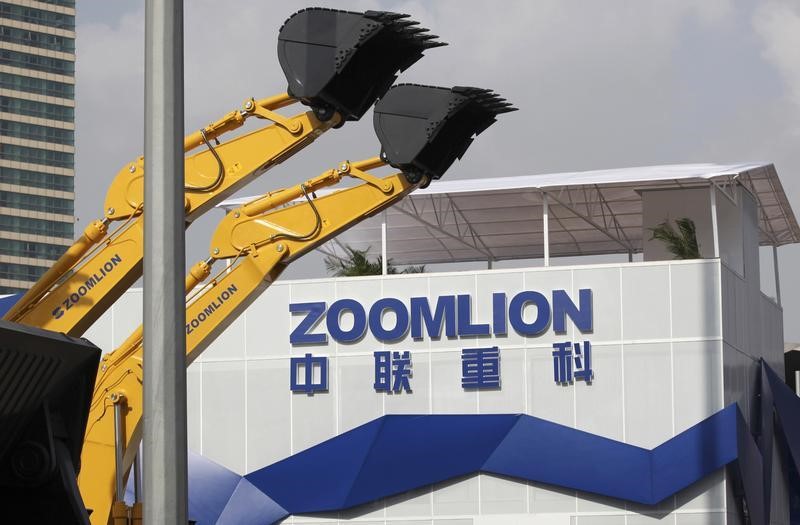By Greg Roumeliotis
(Reuters) - China's Zoomlion Heavy Industry Science & Technology Co Ltd <000157.SZ> has raised its bid for U.S. crane maker Terex Corp (N:TEX), according to people familiar with the matter, as it challenges Terex's merger with Finland's Konecranes (HE:KCR1V).
Zoomlion's latest move shows corporate China's determination to acquire U.S. assets and expand its global footprint. Another Chinese company, Anbang Insurance Group Co, is trying to disrupt hotel operator Marriott International Inc's (O:MAR) merger with peer Starwood Hotels (N:HOT).
Zoomlion's main stumbling block in its negotiations with Terex is the price, rather than concerns that the United States could block the deal because of Terex's ties to the U.S. military and presence in U.S. ports, the people familiar with the matter said this week.
Zoomlion has increased its offer to more than $3.4 billion by adding a special dividend for Terex shareholders of $1 per share to its previous $30 per share cash offer, the people said. Terex has responded by asking for $32.75 per share in cash to terminate its merger agreement with Konecranes and agree to sell itself to Zoomlion, the sources said.
The sources asked not to be identified because the negotiations are confidential.
Terex shares jumped as much as 12 percent on the news and were trading up 7.3 percent at $23.38 in New York on Tuesday.
Terex has argued privately that the synergies with Konecranes in the material handling and port systems businesses of the two companies mean Terex is worth more in the long term than what Zoomlion has offered, Reuters reported last month.
In response to this, Zoomlion has also discussed offering Terex shareholders some type of security that would allow them to benefit from any upside in the potential deal, as opposed to completely cashing out, the sources said.
Among the ideas that Zoomlion suggested are so-called contingent value rights, that would entitle Terex shareholders to specific payments or other benefits if the combined company's shares or financial performance met certain targets, or a public stub, which would allow Terex shareholders to retain some equity, the people said.
The sources said that Terex, however, has rejected these ideas as too complicated, and this prompted Zoomlion to come back with its increased cash offer of $31 per share.
Terex has also held conversations with some of its shareholders who have privately asked it to continue to negotiate a deal with Zoomlion, the people said.
The sources added that among these shareholders is activist hedge fund Elliott Management Corp, which in its most recent filing with U.S. regulators revealed it had acquired a small stake in Terex in the fourth quarter of 2015.
The discussions between Terex and Zoomlion have not advanced beyond price, the people said. Zoomlion's banks, including China Development Bank and the Export-Import Bank of China, are waiting for Terex to provide the access they require for their due diligence in order to finalize their financing commitments, the same sources said.
The sources said there is no certainty that Terex and Zoomlion will be able to bridge their price differences and agree to a deal.
Terex and Zoomlion declined to comment. Konecranes, Elliott, China Development Bank and the Export-Import Bank of China did not immediately respond to requests for comment.
WEAK MARKET FOR CRANES
The battle for Terex coincides with weak demand in the market for cranes, driven by low oil and gas prices and foreign exchange volatility.
Terex reported 2015 fourth-quarter income from continuing operations of $14.6 million on net sales of $1.6 billion, versus income from continuing operations of $79.9 million on net sales of $1.8 billion in the fourth quarter of 2014.
Konecranes has offered 0.8 of its shares for each Terex share. It has argued that the two companies can face the downturn in their cyclical industry more effectively if they join forces, and that the shareholders of the combined companies will reap substantial profits in an upturn.
Westport, Connecticut-based Terex has 97 so-called priority-rated contracts with the U.S. government that could attract scrutiny from the Committee on Foreign Investment in the United States (CFIUS). It also provides mobile harbor cranes in ports that are seen as a critical part of U.S. infrastructure.
However, Terex is not treating CFIUS as an issue that would preclude any deal with Zoomlion. The value of Terex's priority-rated government contracts is small and not material to Terex's business, Reuters reported in January.
The company's ports business in North America is also small, with its biggest contract being a $75 million order for automated equipment at the Long Beach port in California.
Zoomlion is a publicly listed company, with the Chinese province of Hunan as its biggest shareholder with a roughly 16 percent share. It is led by researcher-turned entrepreneur Chunxin Zhan, who founded Zoomlion in 1992 with seven other partners with a loan of 500,000 yuan ($77,000).
Zoomlion now has a market value of 31.8 billion yuan ($4.9 billion). It has acquired significant stakes in six other companies in five countries over the last two decades, and is now present in more than 80 countries.

In 2008, Zoomlion acquired Italy's CIFA, the world's third largest concrete machinery maker. Zoomlion's business also includes other crane machinery, sanitation, earth moving equipment, and financial lease services.